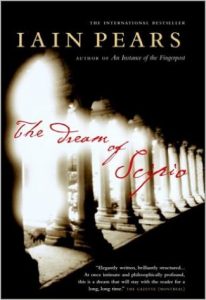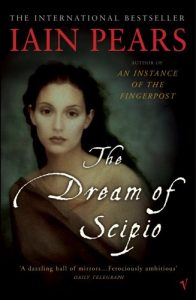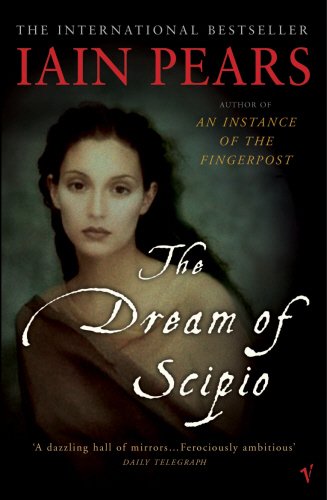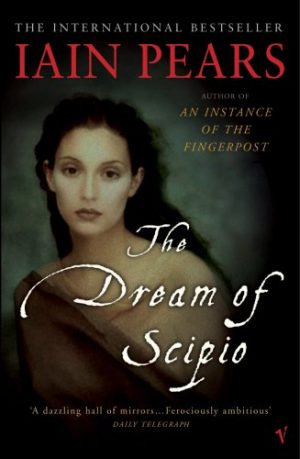The Dream of Scipio – Iain Pears – 2002
Posted by Guillermo Maynez on 14/1/2004, 17:41:12
I think the main subject is this: to analyze deeply the situation incurred by some people who have an unexpected power to make certain crucial decisions at moments when their civilization is simply crumbling down.
Manlius Hippomanes: a community leader desperately witnessing the destruction of the greatest empire the world had ever known, Rome. What should Manlius do? Fight a lost battle just for the sake of honor? Negotiate with the barbarians to try and save what he can of the Roman civilization? You tell me.
Olivier de Noyen has a very promising career in the Church. But Europe is facing the Hundred Years’ War, corruption in the Church and now the Plague. The world comes crumbling down. And now he’s in love with a Jewish girl, and the Jewish are about to be blamed for the Plague, by Olivier’s boss no less, in order to restore the Church’s reputation. What should he do? Remain loyal to his master, to whom he owes everything? Or save his beloved by betraying his boss? Hard choice.
Finally, Julien Barneuve is torn between the coercion to collaborate with the Nazis in order to “civilize” them and keep French civilization, or go to the Resistance and risk certain death. What about the Jewish woman he loves?
I think there are many, many things to talk about related to this wonderful book, but I’ll leave it here for now, hoping someone has read it and is willing to discuss these moral choices, which are the mark of great literature.
~
Posted by Lale on 14/1/2004, 18:37:55
I am still reading the book and for now I can only say this: It is a very very slow moving book.
Normally this is the kind of book I like reading. Period stories, imagery from the past. This one has 3 different eras, so I am supposed enjoy it three times as much. But for some reason, it is going very slowly and it is not gripping me as much as it should. Everytime I pick the book up, I re-read the last page I have read in the previous sitting.
~
Posted by Guillermo Maynez on 14/1/2004, 19:32:34
I don’t know how long you are into it, but trust me on this one, keep reading and it will pick up gradually until dramatic endings.
~
Posted by Lale on 16/1/2004, 19:00:47
Iain Pears on the art of gift-giving
This is my favourite part from the book:
“The choice of book – Vergil’s Eclogues – recognised the young woman’s intelligence and education, suggested that the giver appreciated her interests and shared them. The edition, an Aldine, indicated a commonality of taste and discernment, for how many people truly understand the difference between one edition and another, see beyond the cover which, in this case, needed a good deal of care and attention?
The inscription … was a curious choice. It was hardly appropriate; a bit jarring, a little excessive in a gift otherwise so restrained and refined. …”
I liked this part not because it describes the way I choose my gifts or the gifts I am given, but because of the acknowledgement of subtleties in the message that is transferred along with the gift.
Lale
Posted by Hanh on 18/1/2004, 9:37:56
For me, it’s a bit of a sluggish reading. Although the stories are detailed, they are not alive for me.
The characters are men of intellect living in dark times, in love with forbidden women, making trade-offs to ward of disasters. These are stuff of universal human struggles certainly, but the writing does not make their lives and struggles real. I have a sense of a detached narrator simply telling a story with “just the facts”. I feel a disconnect with the characters, detached from caring about them and their choices, floating on the surface of the stories without caring to be more involved. They don’t seem … interesting, which puzzles me really — what can be MORE poignant than the times they lived in and the decisions they must make?
I must blame the blandness of the writing, I’m afraid. I think that good reads should elicit emotional response. Unfortunately, this one leaves me a bit flat.
~
Posted by Lale on 18/1/2004, 14:49:17
I also was not able to feel compassion (so far, at least) for Olivier or for Julien Barneuve. The book has one hell of an opening. I felt immediate connection with Julien Barneuve and his story to come.
“Julien Barneuve died at 3.28 on the afternoon of 18 August 1943. It had taken him twenty-three minutes exactly to die, the time between the fire starting and his last breath being sucked into his scorched lungs.”
You can’t complain about such an entry. It grabs, you on your upper arm and forces you to sit down and read the rest. The author cannot sustain this kind of urgency, however.
I agree with Hanh that the characters are not alive enough. If you would allow me to make a comparison with Carter Beats the Devil (only because I am reading these two books at the same time), when I read the childhood of Charles Carter and his younger brother James, I felt their joys and fears like my own. I felt anger or dissappointment towards their parents. I *saw* (watched like a movie) their life in their huge, rich home.
In any case, The Dream of Scipio is definitely a book of merit but could have aroused more emotion on the reader’s part. Then nobody would have to put it down.
Lale
~
Posted by moana on 21/1/2004, 17:22:41
I really liked it. In some parts, I felt the writing was a bit slow, but I really liked the attention to detail and all the interesting passages (especially the one you picked, Lale… I remember it stuck out when I read it).
I liked all of the characters, none of them was static; everyone had intelligent reasons to support whatever their actions were. It’s hard to find many books that consider, deeply consider, the actions of the characters.
The real reason I liked the book is that, even though I didn’t agree with every decision every character made, they were all intelligent and considered. It’s a quality I find lacking in most people in society today. People just do things on instinct or whim and justify their actions later. I think this is especially true in America, where children are taught through movies and TV and music to trust their heart and instinct, not their mind and reason. I think perhaps we’d have fewer problems if people stopped blindly trusting their gut and started making considered decisions.
Them’s my thoughts on the book, which I give 4 stars.
~moana
~
Posted by Andrew on 16/1/2004, 20:01:07
Bear in mind I’m barely a hundred pages into it. One of the great points of Pears’ style is that you have to read it so carefully. In one sentence, commenting on the Bishop agreeing to take on Olivier, he writes something to the effect of “…and in doing so completely changed the course of Christianity forever…”
Don’t have to read between the lines as much as read the lines, really read them!
Posted by Howard on 16/1/2004, 22:08:58
When I started reading Dream of Scipio I got 59 pages into it and put the book down. I was simply overwhelmed by all the characters and information. (Perhaps I was just reading too quickly). This novel is a slow read – it is constantly swtiching between the early twentieth century, the Middle Ages and the fifth century and took me a week to finish. Part one is especially slow and the part where I was tempted to give up. I’m glad I kept going – it is an excellent read and well worth the effort.
I would definitely encourage everyone to finish Dream of Scipio if they have time. This book does demand a lot of patience but in my opinion it is the best novel we have read since Memoirs of Hadrian last summer.
My rating for Dream of Scipio is four hearts.
~
Posted by Andrew on 19/1/2004, 6:03:51
I agree, it is well worth the intellectual effort expended in following along. I love how Pears describes things people do, and the offhand way he miniaturizes a character’s fate into half a sentence, as when he described the flea that would find the painter and give him the plague.
Andrew
~
Posted by Howard on 16/1/2004, 21:31:34
I would say that Manlius Hippomanes has the most difficult moral choice of the three to make. (I was dissappointed that his solution – allowing the Burgundians to annex Provence – was given away so early in the novel). For Manlius the stakes are high. As well as Roman civilisation crumbling under an invasion by Euric, Manlius risks losing his estates, serfs, his status and probably his life if he does nothing.
Julien Barneuve has an easier choice to make than Manlius and Olivier. He is not involved in politics, has no living relatives and could easily have sat out the war in Provence had he not been hoodwinked into joining the Vichy regime by Marcel. In contrast to Julien, Marcel is a realist who has no illusions about “civilising” the occupiers. He knows how fragile the power of the Vichy regime is and will do anything to retain his office, even if it means betraying old friends.
~
Posted by Guillermo Maynez on 19/1/2004, 17:17:17
I agree with Howard. Of the three main characters, Manlius is the one with the highest social position and personal power, so of course his decisions are more decisive and influential. Olivier, though not a powerful person, is certainly in the posession of a strategic secret, and so ultimately we are told his decision “changed the course of the Catholic Church forever”. Barneuve’s troubles are more personal, but no less dramatic.
Question of the day:
In your opinion, does the end justify the means?
~
Posted by Andrew on 20/1/2004, 21:34:49
I have long wondered why we must have a definitive answer to this question. Probably I was too stoned during freshman Philosophy 101 to even ‘get’ the questions, much less the answers.
And, ironically, this is one of the reasons that I enjoy The Dream of Scipio so much.
It seems to me that Manlius did not start out with a particular means – for that would have meant he automatically fell into the ‘ends justify the means’ group.
I could feel and sense his consideration of the various permutions of actions/ends………….and that in this case he came to the decision that the end justified the means. I have not yet finished the book, so am not qualified to say more than that. Dare I suspect the same issue to surface with Julien/Julia and Olivier with the yet unidentified young lady?
~
Posted by Hanh on 21/1/2004, 0:10:47
Excellent tie in. For Manlius, evidently the end DOES justify the means, else why become a cleric when he’s mainly not even religious?
In re philosophy (although the only thing I remember of Phil 101 is something about a tree falling and noone being around, and Dr. Katz’ (my prof) annoying habit of tweaking his goatee when posing the profundities to extremely bored freshmen) and whether the ends justify the means, for me this boils down to whether INDEED the end IS better than the means, and who gets to make that decision (that the end IS better than the means). Is there a case when the ends do not justify the means, even though it (as J.S. Mills would say) generate more good for more people than otherwise? Hmmm? Hmmm?
~
Posted by Guillermo Maynez on 21/1/2004, 1:24:55
The question is interesting, although entirely rhetorical. It depends on WHAT ends are to be achieved by WHAT means. In the case of Manlius, it is of course difficult to decide (therein lies the beauty of the book), but of course in the end Manlius decides the end of preserving as much as can be from Roman civilization is worth some lives, his friendship with Felix and a sensation of betrayal (and the loss of Sophia’s admiration and respect). In the end, he is a responsible politician, the kind some of us miss these times: someone willing to make hard decisions, stick to them, and take responsibility for them. I didn’t came to admire Manlius, but I respect him (as I do Olivier and Julien).

Posted by Andrew on 21/1/2004, 5:40:40
: I didn’t came to admire Manlius, but I respect him (as I do Olivier and Julien).
Guillermo, I’m only halfway through, so I hesitate to ask, and even get a sense of what you’ll say; but what is the difference between admiring and respecting Manlius? What caused you to feel this way?
Andrew
~
Posted by Hanh on 21/1/2004, 6:56:58
: The question is interesting, although entirely
: rhetorical. It depends on WHAT ends are to be achieved
: by WHAT means.
Exactly, the WHAT defines the IS, in effect. That is, if the End actually IS better than the Means, that can only be defined by WHAT actually accomplishes.
At one end of the end-justifies-means scale, there is someone like Manlius, who might be the kind of guy who thinks any end justifies any means, as long as he thinks the means is worthy. He himself defines the WHAT for his actions.
At the other end, there are the early Roman Christians who would die rather than denounce Christ because they believed the end (not to be fed to the lions) is not justified by the means (denouncing Christ so as not to be fed to the lions), according to God. God defines the WHAT for their actions.
So the meta question then is: WHO defines the worthiness of the end-justifies-means cost-benefit ratio? If it’s yourself (like Manlius), the ethics is situational — you can justify any ethical position as long as the end makes sense to you. However, if the “definer” is the Divine, then the ethics is static, established by laws set down by the Divine — you don’t have much room to wiggle to justify your means (into the lion’s den you go).
Which brings up the next question: Is it more “righteous” for each person to define his/her own end/means definition? Is Manlius a righteous man? Or is it more “righteous” to obey universal ethical laws? Is “thou shalt not kill” ALWAYS bad? David killed Goliath, no?
I haven’t finished Scipio yet, so Guillermo, help me out here. How do I tie this back into the story? Because this is a thread that would really make the rest of this book interesting to me, but I can’t really get there yet.
Dang, now I have to finish it so we can discuss it!
~
Posted by Guillermo Maynez on 21/1/2004, 19:17:30
Andrew, Hahn (and the rest): Either you are a religious person or not. It’s hard to find the middle ground. I think one of the strengths of this book is that it presents to you characters right at the limit of a decision-making process, with clear-cut choices. Andrew poses a great question for me: what is the difference between admiring and respecting Manlius? I don’t want to spoil the end for you, but I think it is hard to admire Manlius for the choice he makes at the end, because it involves bloodshed and sheer cruelty. But I have to respect him for one reason: he had to choose, he did so according to a courageous character, and he took responsibility for his actions. Now let’s be precise here: he had the courage to do what he thought was the best possible course of action, accepting that many people would think of him as a coward and a traitor. He also accepted to lose the respect of a dear one. Another thing that I liked about the book is that the ethical context in which each character is living in is no easy, straightforward one. They’re not living in a homogeneous community in times of peace. Each one of them is witnessing and participating in the crumbling down of their civilizations. Choices are hard and involve the emotional with the political. Each one of them must choose between a hard sacrifice and another equally hard. Each decision involves lives and deaths. Manlius lives in a religious vaccuum: the Roman gods are not believed in anymore, and Christianity is in diapers, still a rough religion for desperate people. Olivier lives in another: the Catholic Church is going through one of its darkest and most corrupt moments. Julien Barneuve witnesses the horrors of nazism.
One of the reasons it’s great to discuss books with you friends is that one gains insight. Maybe Lale and the one who related her question to “Scipio” hit the nail on what this book is all about: Does the end justify the means? What answer for each one of the three characters?
Posted by Hanh on 21/1/2004, 23:08:36
I should have used “philosophy” instead of “religion”, which is more appropriate to the characters, as you said, religion only has superficial meaning in context. The characters live by philosophical dictates rather than religious ones. I think they suffer the same ethical problems as religious people however, and that is: in a tight bind, how much of that philosophy/religion goes out the window? how big is the struggle in the conscious making of that choice? was the choice made for yourself or for others? i.e. did you sacrifice your own spirituality for some greated good, the way soldiers sacrifice their own lives in a war?
Which goes back to your comment about admiring vs respecting Manlius. Manlius can be respected for the stoicism he took in carrying out his ends once his decision was made (in a no-guts-no-glory-no-mamby-pamby kind of respect), but for me, whether he is admirable depends on the reason he made that choice — did he do it for himself? for some selfish personal (or collective/Roman) vanity? or did he do it for “civilization” and mankind?

Posted by Andrew on 22/1/2004, 0:46:01
: I should have used “philosophy” instead of
: “religion”, which is more appropriate to the
: characters, as you said, religion only has superficial
: meaning in context.
I am but a neophyte in philosophical matters, and my Judaism is far more important to me as tradition and history than as religion.
Perhaps this is why I find the book so fascinating. I can read it only in brief gulps: at meals, taking a break from study, and for a half-hour or so before bed (so that I don’t dream about hair-splitting legal issues relevant only to the bar exam and of no consequence to the real world).
I do not believe in God, but believe that there is such a thing as a soul and have long struggled to articulate what it is.
I greatly appreciated Sophia’s discussion of Aristotle’s view that the soul is a sphere that is separated at birth and must seek its other half. And for what it’s worth, I have my other half, though now in our middle age we more resemble an oval…….
~
Posted by Hanh on 22/1/2004, 6:38:26
: for what it’s worth, I have my other half, though now
: in our middle age we more resemble an oval…….
An oval is a circle with a lot of pizzazz, still infinite, still whole, it just rolls along with a lot more style. 🙂
~
Posted by Rizwan on 22/1/2004, 17:00:54
Hanh, kudos to you. To my knowledge, your posting marks the first time in the whole history of humankind that the phrase “mamby-pamby” has been used in a serious discussion. 😉
~
Posted by Andrew on 22/1/2004, 7:10:22
Has anyone given any thought to the names of the characters in Scipio?
Manlius Hippomanes: my latin fails me (all I remember is ‘Bellum Gerere’ – which seems to be our president’s motto) Is there some suggestion to it? It seems too deliberate for ‘just something contemporaneous and nice-sounding.’
I discount Olivier, the name seems random and time-appropriate enough. Rebecca, well – we’re not at all sure she’s really Jewish are we? And in those days it would have been closer to the original Hebrew, whatever that was (Rebekeh?)
Most interesting is the modern segment. Julien/Julia Barneuve/Bronson…so suggestive of halves of the spheres of a single soul as I mentioned earlier.
And I assumed at first that Julien was Jewish. Bar**** is not an uncommon prefix to family names. Bar-Kochkba, Bar-Etzion come to mind. I wonder….
~
Posted by Liliana on 22/1/2004, 16:11:29
I know that Hippus comes from the Greek and it means “horse” (the latin name of the seahorse is hippocampus). Manes is latin for “shade”….
C’est tout mes amis!
Posted by Andrew on 23/1/2004, 5:46:09
Alors! A dictionary you ain’t. Come then, tell us what this suggests to you. Sophia’s the easy one. Manlius Hippomanes, why not something more conventional…Julius, Claudius, Marcus? There must be something to it. And Horse + Shade, I doubt Pears is showing off his versatility with latin. What do y’all make of it? (Hanh, I don’t wanna hear anything about hippopotomus meaning ‘horse too big for the kettle’ [pot])
~
Posted by Hanh on 23/1/2004, 10:08:25
: make of it? (Hanh, I don’t wanna hear anything about
: hippopotomus meaning ‘horse too big for the kettle’
: [pot])
Jawohl!! I will NOT, repeat, will NOT be mentioning anything about hippo (ancient Greek for ‘horse’) + po (ancient Greek for ‘too big for’) + pot (ancient Greek for ‘pot’) + omus (ancient Greek for ‘or kettle’). You will not hear it from me. Mums the word. Zip.

Posted by Anna van Gelderen on 23/1/2004, 17:46:56
I seem to recall that somewhere it says the guy is from Gallic, i.e. Celtic stock. Since his name does not seem to be Roman, I hypothesize that it is Celtic, with Latin endings pasted on (as they did with the names of my Germanic forebears).
Since I don’t know a word of ancient Gallic I have no idea what the name Manlius Hippomanes means, but if I had to vote I would definitely go for Hanh’s interpretation.
~
Posted by Julie on 16/2/2004, 7:27:37
Sophia traditionally means Wisdom in philosophy with many references in philosophical cirles. It is related to ‘philosophia’ in Greek. Rebekah is also known to be used interchangeably with Wisdom.
~
Posted by Andrew on 29/1/2004, 7:18:12
Five very bright stars from me. The book gave me something to think about every time I picked it up. Sound bites galore. I loved Ian Pears’ style so much as soon as I get any money I’m going out to buy his earlier book.
It’s hard to describe why his descriptive powers moved me so much. It’s not that every time he wrote about something I could see it in my mind’s eye, but more the beauty of the way he used words.
He can give you the result and go on to tell how it happened. Usually that’s a recipe for boredom or melodrama. Not so here.
Poor Pisano. Guillermo, I understand what you meant about respecting Manlius but not admiring him. In the end he was the most sucessful of our three main characters, but his methods were a rejection of all he had studied.
I was utterly mesmerized by the plots and counterplots, and how he wove the three stories into a fairly seamless whole.
Andrew
Posted by Guillermo Maynez on 29/1/2004, 18:25:05
Well, I also give it five bright stars (although I don’t usually like to give starts at all). I liked the fact that, although there are common threads that unite the three stories, they are not repetitions. Each one of the three main characters is unique, not a mirror image of the others. Each woman is also different. As Andrew says, Pears has a great ability to depict, to bring to life cities, streets, costumes, parks, rooms. He is very much in control of his narrative, not dull but never letting emotions overshadow the cleanliness of the narrative. The end of Rome, the Great Plague in Avignon, and Southern France in WWII: great sceneries for putting your characters at hard crossroads.

Word of the day (src The Oxford Universal Dictionary):
NAMBY-PAMBY (1745)
{formed fancifully on the name of Ambrose Philips (died 1749), who wrote pastorals ridiculed by Carey (in Namby Pamby 1726) and Pope}
adverb, adjective etc.
1. Of style, actions etc. : weakly sentimental, insipidly pretty.
2. Of persons: inclined to affected daintiness, of a weak or trifling character (1774)
substantive
That which is marked by affected prettiness and feeble sentimentality (1764)
A namby-pamby person (1885)
Namby-pambyism (1834)
“She was a namby-pamby milk-and-water affected creature.” THACKERAY
“Manlius can be respected for the stoicism he took in carrying out his ends once his decision was made (in a no-guts-no-glory-no-mamby-pamby kind of respect), but for me, whether he is admirable depends on the reason he made that choice — did he do it for himself? for some selfish personal (or collective/Roman) vanity? or did he do it for “civilization” and mankind?” Hanh Vu
“Hanh, kudos to you. To my knowledge, your posting marks the first time in the whole history of humankind that the phrase mamby-pamby has been used in a serious discussion. ;-)” Rizwan Hassan
(Neither Hanh Vu nor Rizwan Hassan are Professors of English, therefore the corruption of namby-pamby into mamby-pamby is understandable. – LE)
















